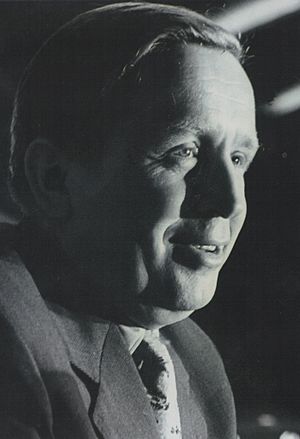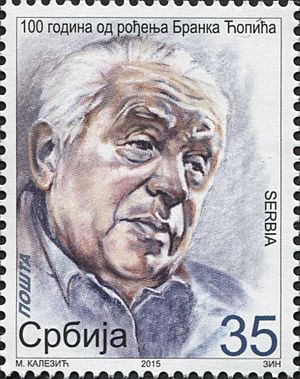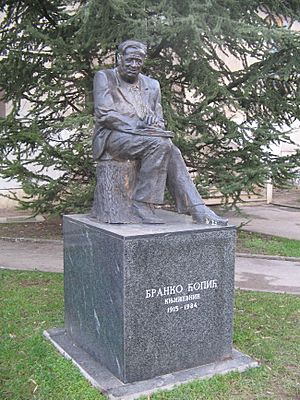Branko Ćopić facts for kids
Quick facts for kids
Branko Ćopić
|
|
|---|---|
 |
|
| Born | 1 January 1915 Hašani, Bosnia and Herzegovina, Austria-Hungary |
| Died | 26 March 1984 (aged 69) Belgrade, SR Serbia, Yugoslavia |
| Resting place | Alley of Distinguished Citizens, Belgrade New Cemetery |
| Occupation | Novelist, short story writer |
Branko Ćopić (Serbian Cyrillic: Бранко Ћопић; 1 January 1915 – 26 March 1984) was a famous writer from the former Yugoslavia. He wrote many poems, short stories, and novels. He became especially well-known for his stories for children and young people. These stories often took place during World War II in Yugoslavia. He used a special kind of humor, like gentle teasing and clever jokes, in his writing.
Branko Ćopić was a very popular writer. His books sold millions of copies. This allowed him to make a living just from his writing, which was quite rare back then. Because his stories were so good, some of them were even included in school textbooks. Many of his novels became required reading for students.
In the early 1950s, he also wrote stories that made fun of social problems and political leaders. Because of this, some people saw him as a "dissident," meaning someone who disagreed with the government. He sometimes had to explain his writings to the leaders of the Communist Party.
Contents
Branko Ćopić's Life Story
Branko Ćopić was born on January 1, 1915. His family was Bosnian Serb. He was born in a village called Hašani, near Bosanska Krupa in western Bosnia. He went to a junior high school, called a gymnasium, in Bihać. Later, he attended teacher's colleges in different cities like Banja Luka and Sarajevo. He then moved to Belgrade to study at the University of Belgrade Faculty of Philosophy. He finished his studies in 1940. He once said he was "afraid of the big city" when he first arrived in Belgrade in 1936.
Joining the Partisans in World War II
When an uprising started in Bosnia in 1941, Branko Ćopić joined the Yugoslav Partisans. The Partisans were a group fighting against the invaders during World War II. He stayed with them until the war ended. During this time, he worked as a political leader for his group. He also wrote as a war reporter for the Borba newspaper. His experiences during the war greatly influenced the stories he would later write. After the war, he returned to Belgrade. He worked as an editor for several magazines until 1949. One of these was Pionir ("Pioneer"), a children's magazine.
Later Life and Recognition
Branko Ćopić became a member of the Serbian Academy of Sciences and Arts in 1965. He became a full member in 1968. He also joined the Academy of Sciences and Arts of Bosnia and Herzegovina.
Many of his books and stories were used in primary school lessons. His works have been translated into more than thirty languages. These include English, German, French, and Russian. Some of his stories have even been made into TV shows. He was once featured on a 0.50 Bosnia and Herzegovina convertible mark banknote.
Branko Ćopić's close friend and biographer was Enes Čengić. Čengić wrote several books about Ćopić's life and works. These books helped people understand Ćopić's humor and his view of the world.
Branko Ćopić's Writing Career
From 1951 until his death, Branko Ćopić was a full-time writer. He was so popular that his books sold millions of copies. This happened both in Yugoslavia and in other countries.
Early Works and Success
His very first published short story was Smrtno ruvo Soje Čubrilove ("Death Robe of Soja Čubrilova"). It appeared in the Belgrade daily newspaper Politika in 1936. The editor of Politika, Žika Milićević, was very strict. He first rejected many of Ćopić's stories. But Ćopić kept writing and sending them. Finally, Milićević started printing them. He even promised to publish two of Ćopić's stories each month if they were good. Before World War II started in 1941, Politika had published 125 of his stories. Ćopić felt that working with Politika was a "great boost" and the "start of a serious writing career."
His first collection of short stories was published in 1938. He continued writing throughout the war. His first two collections, Pod Grmečom (Under the Grmeč, 1938) and Borci i bjegunci (Fighters and Runaways, 1939), were about his home region of Bosnia and Herzegovina. These collections showed his talent for telling stories. In 1939, he won the Milan Rakić Award, which came with a money prize. He joked that he was "richer than the emperor" after winning it.
Themes and Style
Ćopić's stories often featured characters, places, and themes from his home region, Bosnian Krajina. Before the war, his writing was often poetic and focused on feelings. Examples include Rosa na bajonetima (Dew on the Bayonets, 1946). After the war, his writing often focused more on social and political ideas. His short stories were often described as the "stories of a dreamer boy."
He also published collections of poems, such as Ognjeno rađanje domovine (Fiery Birth of a Homeland, 1944). In his war stories, Ćopić added humor and funny parts. His novels Prolom (The Break-out, 1952) and Gluvi barut (Silent Gunpowder, 1957) painted a big picture of the first war years in Bosnian Krajina. A very important book in his post-war writing was Doživljaji Nikoletine Bursaća (The Adventures of Nikoletina Bursać).
His collection Bašta sljezove boje (The Mallow-color Garden, 1970) starts with a letter to his friend Zija Dizdarević. In this book, Ćopić suggests that writing helps him escape sad thoughts. He often saw the world through the eyes of good-hearted "fools." Even with all the humor, there was a sense of sadness and disappointment in his stories.
Works for Children
Branko Ćopić wrote many beloved poems and stories for children. Some of his most famous works for young readers include:
- Priče partizanke (Partisan Stories)
- Nasmejana sveska (Smiley Notebook)
- U carstvu leptirova i medveda (In the Realm of Butterflies and Bears)
- Ježeva kućica (Hedgehog's House)
- Doživljaji mačka Toše (Adventures of Toscho the Cat)
- Orlovi rano lete ("Eagles Fly Early"; 1957)
Branko Ćopić's Social Criticism
In the early 1950s, Branko Ćopić started writing satirical stories. Satire is a way of using humor, irony, or exaggeration to criticize people's mistakes or foolishness. He criticized problems and people in the country's political life. He disliked how some "comrades" became greedy and how bureaucracy (too many rules and paperwork) grew. He also hated flattery, where people praise others too much just to get ahead. Because of these stories, he was seen as a "dissident" and had to explain himself to the Communist Party leaders.
Challenging the System
Using humor, Ćopić pointed out what he saw as problems in the new communist society of Yugoslavia. In 1950, he published Jeretička priča (Heretic Story). This story made fun of new behaviors he saw. For example, he wrote about state company managers and army generals using public money for fancy cars and trips to expensive resorts. They seemed unwilling to give up the benefits they got after the war. Because of this story, another writer criticized him in a literary magazine.
The state security agency, UDBA, even started a file on him. One of his friends, who was secretly an UDBA agent, reported Ćopić's strong words against the political leaders. Ćopić then published another critical work, Ko s đavolom priče piše (He Who Writes Stories with the Devil). The Yugoslav Communist Party criticized him. Even the country's leader, Josip Broz Tito, publicly spoke against Ćopić in 1950. Tito said that Ćopić was making their whole society look bad and that they would not allow such "enemy satire."
Ćopić's mother, Stoja, once attended a meeting where Tito angrily said, "He lies! He is not telling the truth!" about Branko. Stoja bravely replied to Tito, "My Branko never lies." Despite the attacks, Ćopić kept his sense of humor. He even hung a newspaper page on his door where Tito had said he would not arrest him.
Facing Consequences
Ćopić was later accused of supporting Milovan Đilas, another critic of the government. In 1953, Ćopić wrote a letter defending himself from the "new class" (rich and powerful communists). He said there were "massive numbers of flatterers, slimy people, and weaklings" in the party. He felt these people were taking over important positions.
Because of his story Izbor druga Sokrata (The Election of Comrade Socrates) and his novel Gluvi barut (Silent Gunpowder) in 1957, he was criticized again. He explained that he was showing people who became a bit harsh during the war. He said they believed they were doing what was best for the revolution. Even though he wanted to stay in the party, he was eventually expelled in 1960.
After he was expelled, many cultural centers stopped inviting him to give talks. They often said they were "painting the house" as an excuse. He once asked his former party friends, "How long is this painting going to last?"
He once explained his writing approach when questioned by party officials: "Before you start writing, imagine that 50 years have passed. Imagine that you and those questioning you today are no longer alive. Someone starts looking through old records. Write in a way that you won't feel ashamed in front of that unknown person from the future."
Even though he tried to stay cheerful, being expelled from the party was a big blow to him. Besides Tito, other important party leaders attacked him. What hurt him even more were the attacks from other writers who were his colleagues. They avoided him later, "as if he had tuberculosis."
Ćopić once said about his social criticism: "I was tired of all that satire about small-town people and priests. I didn't want to close my eyes to the social and political problems in new Yugoslavia either."
Branko Ćopić's Personal Life
Branko Ćopić's father and uncle fought in World War I on opposite sides. His father was in the Austro-Hungarian Army, and his uncle was a volunteer in the Royal Serbian Army. Both survived the war. However, Branko's father died when Branko was only four years old. His uncle, grandfather, and mother then helped raise him.
Sadly, both his brother Rajko (in 1942) and his sister Smiljka (in 1943) were killed in World War II. Ćopić wrote a poem for his sister called Grob u žitu (Grave in the Grains).
Ćopić met his future wife, Bogdanka Ilić, in 1945. She was nicknamed Cica. Bogdanka later became a children's doctor. They married in 1950 and stayed together until his death.
Ćopić loved to read, enjoyed paintings, and liked films and theater. He even wrote some screenplays. He admired writers like Miguel de Cervantes and Miroslav Krleža. He called himself Lički Bosanac ("Lika's Bosnian"). Ćopić believed that loneliness was hard and that life was short. So, he said, life should be spent with love, agreement, and understanding.
Death
Branko Ćopić passed away on March 26, 1984.
Awards and Recognition
Branko Ćopić received many awards throughout his writing career. Some of these include:
- Academy of Seven Arts Award (1938)
- Rakić Award (1939)
- Serbian Royal Academy Award (1940)
- City of Belgrade October Award (1956)
- NIN Award for best novel for "Bronze Guards, Don't Mourn" (1958)
He also received several important Yugoslav decorations for his contributions.
Legacy
Many of the characters Branko Ćopić created were based on real people from his home region, near the Grmeč mountain. Ćopić himself thought his most important works were three novels: The Mallow Color Garden, The Adventures of Nikoletina Bursać, and The Eighth Offensive.
Film director Puriša Đorđević made a documentary about Ćopić in 2016. It was called Moja Mala iz Bosanske Krupe.
Author and critic Mihajlo Pantić said that no matter what Branko Ćopić wrote—poems, novels, or stories—he was always a lyric poet. Pantić added that Ćopić was a constant figure in Serbian literature of the 20th century and its last true storyteller.
Branko Ćopić's Works
Novels
- Prolom – The Break-out (1952)
- Gluvi barut – Silent Gunpowder (1957)
- Ne tuguj, bronzana stražo – Bronze Guards, Don't Mourn (1958)
- Osma ofanziva – The Eighth Offensive (1966)
Novels for Children
- Orlovi rano lete – Eagles Fly Early (1957)
- Slavno vojevanje – Glorious Combat (1960)
- Bitka u Zlatnoj dolini – The Battle of Golden Valley
- These three are known as „Pionirska trilogija“ – The Pioneer Trilogy.
- Magareće godine – "Donkey" Years (meaning: The Tough Teens)
- Ježeva kućica – Hedgehog's House (1949)
- Doživljaji mačka Toše – Adventures of Toscho the Cat
- Bašta sljezove boje – The Mallow Color Garden
Films and TV Series Based on His Writings
- Eagles Fly Early (1966)
- Osma ofanziva, TV-series (1979)
- Silent Gunpowder (1990)
- Magareće godine (1994)
- Ježeva kućica (2017)
See also
 In Spanish: Branko Ćopić para niños
In Spanish: Branko Ćopić para niños
- Serbian literature
 | John T. Biggers |
 | Thomas Blackshear |
 | Mark Bradford |
 | Beverly Buchanan |



